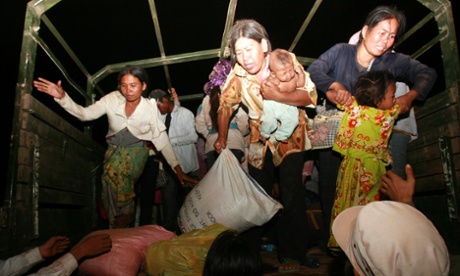 |
| Cambodian refugees get out from a truck at Sra Em village after leaving Preah Vihear temple where Thai and Cambodian soldiers exchanged rifle and rocket fire in 2009. Photograph: Chor Sokunthea/Reuters |
Cambodia is no place to resettle the refugees Australia does not want
Dumping refugees in under-resourced, aid dependent countries can have disastrous consequences for all involved
In proposing to resettle Australia’s refugees in third countries,
the Australian government is turning the humanitarian process of refugee
resettlement into a politically motivated form of refugee deterrence.
The Cambodian government this week agreed in principle
to resettle some of Australia’s refugees from Nauru. But the small
number of refugees already in Cambodia face serious problems, including
difficulty finding work because of language barriers and discrimination,
lack of access to citizenship, and a corrupted legal system that fails to protect their rights. The conditions are so challenging that most hold out hope for future resettlement in a country like Australia.
Of most concern has been Cambodia’s willingness to deport refugees back to a place of potential harm. In 2009, Cambodia violated international law when it forcibly repatriated 20 Uighur refugees, including two children, to China. China publicly thanked Cambodia for the deportation before signing up to trade deals worth around US $850m.
Those granted refugee status in Papua New Guinea (PNG) will receive visas
with “work rights and freedom of movement”, but no other details have
been made available. A PNG expert panel is due to report back this week
with recommendations on resettlement arrangements, but even with
provision of basic assistance to be paid for by Australia, the
challenges for refugees will be enormous.
Back in October 2012, the then-UNHCR regional representative Richard Towle voiced alarm
at the lack of durable solutions for refugees in PNG. He warned that
Port Moresby –the location for most “out-of region refugees” –was “a
very dangerous and expensive place for people to live”. After a visit to
Manus Island in October 2013, UNHCR again raised concerns about the “severe limitations”
of finding safe, long term solutions for non-Melanesian refugees. UNHCR
noted that refugees in PNG had previously been relocated to third
countries, including Australia.
Dumping refugees in
under-resourced, aid dependent countries can have disastrous
consequences for all involved. Only a well developed resettlement
program, coupled with a supportive and safe environment, can address the
long term needs of both the refugee and the resettlement country.
Pathways
for integration into local communities should be offered. Communities
need to be inclusive and welcoming of new arrivals. Resettlement is
about providing education, medical services, specialist torture and
trauma counselling when necessary, access to work (not just work
permits), language classes, interpreting services and ultimately,
citizenship. Initial support should include orientation programs and
assistance to find housing and work.
A recent article on the PNG Edge website reports that only one province
in PNG has put up its hand to resettle Australia’s refugees. The
governor of West New Britain is reportedly open to refugees working
there in the palm oil industry. Another report claims refugees who refuse PNG resettlement will be handed back to the Australian government to “deal with”.
Using
resettlement as a strategy for deterring refugees is reckless and
harmful to all involved. Australia has the capacity to accommodate many
more refugees, and we have particular obligations to those who have
arrived seeking our help. Refugees should be returned to Australia and
assisted to begin new lives here, free from fear and future uncertainty.


No comments:
Post a Comment